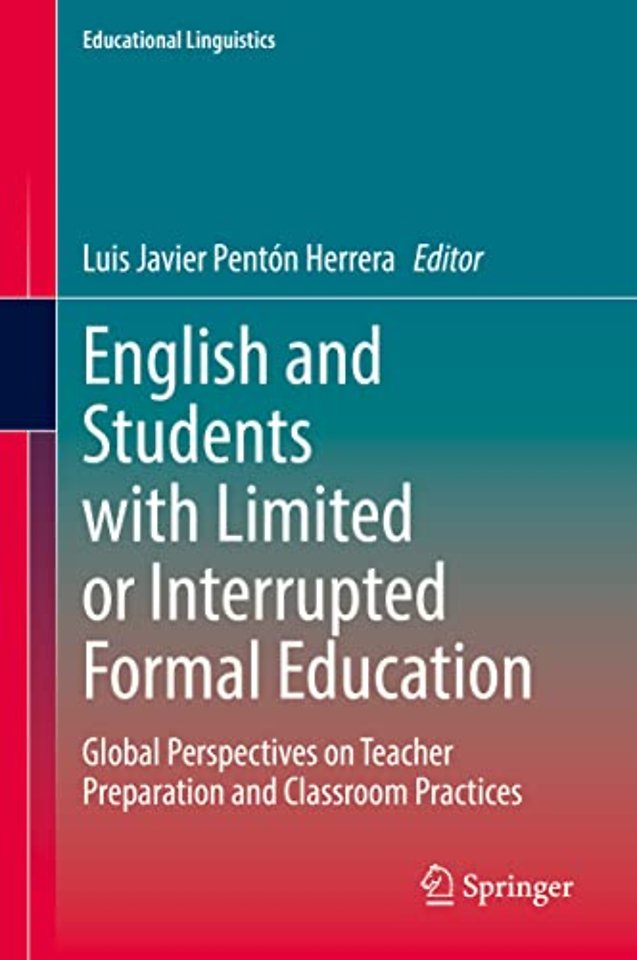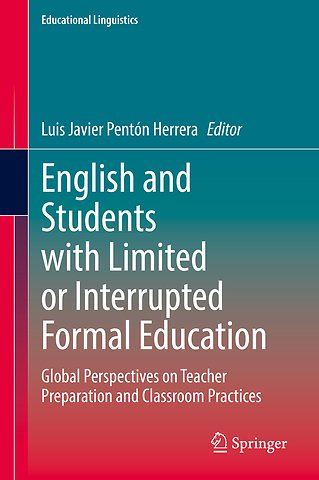English and Students with Limited or Interrupted Formal Education
Global Perspectives on Teacher Preparation and Classroom Practices
Samenvatting
This book examines students with limited or interrupted education (SLIFE) in the context of English learners and teacher preparation courses from a cultural and social lens. The book is divided into five parts. Part I frames the conversation and contributions in this edited volume; Part II provides an overview of SLIFE, Part III focuses on teacher preparation programs, Part IV discusses the challenges faced by SLIFE in K-12 learning environments and Part V examines SLIFE in adult learning environments.
This book is unique in that it offers practical instructional tools to educators, thus helping to bridge theory and practice. Moreover, it retains a special focus on K-12 and adult SLIFE and has an inclusive and international perspective, which includes a novel theoretical framework to support the mental, emotional, and instructional needs of LGBTQ+ refugee students.
The book is of interest to teacher educators, in-service and pre-service teachers, English literacy educators, graduate students, tutors, facilitators, instructors, and administrators working in organizations serving SLIFE in K-12 and adult learning environments.
Specificaties
Inhoudsopgave
<p>Foreword by: Dr. Brenda Custodio </p>
<p>Preface </p>
<p>Acknowledgements</p>
<p> </p>
<p>Part I. Overview of students with limited or interrupted formal education</p>
<p> </p>
<p>Chapter 1: English learners with limited or interrupted formal education in primary and secondary classrooms</p>
<p>Author: Luis Javier Pentón Herrera, Ph.D., American College of Education</p>
<p> </p>
<p>Chapter 2: Adult English learners with limited or interrupted formal education in diverse learning settings</p>
Author: Jamie Harris, M.Ed., Maryland Department of Labor<p></p>
<p> </p>
<p>Chapter 3: Why, how, and where to advocate for English learners with limited or interrupted formal education</p>
<p>Authors: Heather Linville, Ph.D., University of Wisconsin, La Crosse</p>
<p>Luis Javier Pentón Herrera, Ph.D., American College of Education</p>
<p> </p>
<p>Chapter 4: Teaching children and youth overcoming war through a trauma-informed lens</p>
<p>Authors: M. Kristiina Montero, Ph.D., Wilfrid Laurier University</p>
<p>Aphrodite Al-Zouhouri, M.Ed., Wilfrid Laurier University</p>
<p> </p>
<p> </p>
<p>Part II. Teacher preparation programs</p>
<p> </p>
<p>Chapter 5: Teacher preparation in the US for working with SLIFE</p>
<p>Authors: Brenda Custodio, Ph.D., Ohio State University</p>
<p>Judith B. O’Loughlin, M.Ed., Language Matters, LLC</p>
<p> </p>
<p>Chapter 6: Understanding SLIFE in teacher preparation programs</p>
<p>Authors: Andrea DeCapua, Ed.D., New York University and University of North Florida</p>
<p>Helaine W. Marshall, Ph.D., Long Island University – Hudson Campus</p>
<p> </p>
<p>Chapter 7: Shifting ESL pedagogies: Following a teacher’s journey to respond to educational needs of adolescent refugees with limited or interrupted formal education</p>
<p>Authors: Stephanie Ledger, M.Ed., Waterloo Region District School Board</p>
<p>M. Kristiina Montero, Ph.D., Wilfrid Laurier University</p>
<p> </p>
<p>Chapter 8: Best practices in meeting the literacy and postsecondary needs of adolescent SLIFE</p>
<p>Authors: Michelle Ivette Marrero, Ed.D., Arlington Public Schools</p>
<p>Charlene Désir, Ed.D., Nova Southeastern University</p>
<p> </p>
<p> </p>
<p>Part III. Effective support for SLIFE who are ELs in K-12 learning environments</p>
<p> </p>
<p>Chapter 9: Fostering the resilience and cultural knowledge of students with limited or interrupted formal education (SLIFE) through culturally-sustaining pedagogies</p>
<p>Authors: Saskias Casanova, Ph.D., University of California, Santa Cruz</p>
<p>Alicia Alvarez, University of California, Santa Cruz</p>
<p> </p>
<p>Chapter 10: Theory and Praxis: Supporting LGBTQ SLIFE in the Classroom and Beyond</p>
<p>Authors: Ethan Trinh, M.A.T., Ph.D. Candidate, Georgia State University</p>
<p>Aaron Burgess, M.S.W., Ph.D. Candidate, University of North Alabama and Florida International University</p>
<p> </p>
<p>Chapter 11: Supporting elementary-age ELs with limited or no formal school</p>
<p>Authors: Judith Cruzado-Guerrero, Ph.D., Towson University</p>
<p>Gilda Martínez-Alba, Ed.D., Towson University</p>
<p> </p>
<p>Chapter 12: The promise of problem-based service-learning and SLIFE: Building the future in the classroom today</p>
<p>Authors: Margaret Aker, Ph.D., Concordia University Chicago</p>
<p>Lynn Rochelle Daniel, Ed.S., Ph.D. Candidate, Concordia University Chicago</p>
<p>Luis Javier Pentón Herrera, Ph.D., American College of Education</p>
<p> </p>
<p> </p>
<p>Part IV. Effective support for SLIFE who are ELs in adult learning environments</p>
<p> </p>
<p>Chapter 13: Implementing MALP© in Refugee-Background Adult Education</p>
<p>Author: Nan Frydland, MFA, M.S.Ed., Frydland & Co., LLC</p>
<p> </p>
<p>Chapter 14: The case for direct, explicit instruction for adult refugee SLIFE</p>
<p>Authors: Zohar Friedman, M.A., Tel Aviv University</p>
<p>Rachel Joyce Laitflang, M.A., Tel Aviv University</p>
<p>Alon David Pilosoph, M.A., Tel Aviv University</p>
<p> </p>
<p>Chapter 15: Using participatory arts to uncover adult latinx language learner identities and agency</p>
Author: Andrea Enikő Lypka, M.Ed., Ph.D. Candidate, University of South Florida<p></p>
<p> </p>
<p>Chapter 16: The importance of morphosyntax for post-puberty immigrants with little or no formal schooling</p>
<p>Authors: Egle Mocciaro, Ph.D., Silesian University of Opava</p>
<p>Martha Young-Scholten, Ph.D., Newcastle University</p>
<p> </p>
<p>Chapter 17: “We should learn English to solve our problems”: Strategies to support Emergent-literacy adult ESL learners</p>
<p>Author: Tabitha Kidwell, Ph.D., American University</p>

